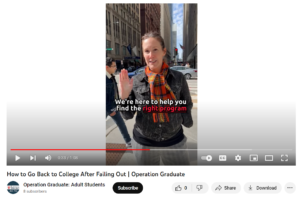Returning to college after taking a break from school can be an exciting thing. However, it can also be a nerve wracking experience, especially if you’re maintaining a full-time job and other life responsibilities. The good news is that today more than ever, universities are equipped to prepare and graduate non-traditional students. Going to school after taking a hiatus can be challenging, and you’ll more than likely face barriers along the way., but keep in mind that you can graduate if you’re determined to. If you’re going back to school after taking a break, check out these tips to help make your transition as easy as possible.
-
Plan out your finances and time
If there’s two resources college takes a lot of, it’s time and money. If you’re not careful with managing these assets, you can lose a lot of these important means. This is why it is extremely important to balance both your time and money while you’re in college.
After you receive your financial aid award letter, you’ll have an estimate of how much you’ll have to pay out-of-pocket. Consider creating a budget for all your college expenses. You can do this by downloading a budgeting app, for example. You’ll want to add expenses for textbooks, tuition, supplies, etc.
Once your finances are in order, you’ll want to start managing your time as well according to your new college schedule. It’s important to use time management skills as you might be juggling a few classes at a time. Combined with a full time job and other responsibilities, it can be easy to fall behind if you’re not careful. Consider using a planner or digital calendar to create a detailed schedule, and stick to it!
-
Prioritize yourself
Remember why you chose to return to college in the first place–to earn your degree! But, know that there will probably be roadblocks along the way, it’s normal and expected for many college students. However, make an effort to not let school get too overwhelming that you get burnt out. If you feel yourself getting overwhelmed to the point where you’re thinking of dropping out, take a step back and remember why you came to finish your degree in the first place.
You should take preventative measures to make sure you can manage the stress that may come with college. Ask for help when you need it and take it one day at a time. Make sure to prioritize yourself and don’t let yourself get to a breaking point where you’ll want to leave college again.
-
Build relationships
It’s a great idea to build relationships with professors and fellow students early in your college career. When you build relationships with fellow students and professors, it can open up opportunities for you. Connecting with students and others on campus can also give you a sense of community. You’ll not only make friends this way, you will expand your network and create connections which can help you in your future career!
-
Choose the right major
Carefully consider what you’ll choose to study when you go back to college. If you’re planning on studying the same thing, make sure careers in that field still align with your goals. Likewise, if you choose a different field of study, do some research into careers in that field so you can develop a plan for after you graduate.
-
Consider starting out part-time
If you dive head-first into college after taking a long hiatus, you might get overwhelmed from the sudden change. You may want to consider attending part-time rather than full-time, at least while you’re starting out. This will give you time to adjust and get back into the swing of being back in school. This will also give you some extra time to prepare for classes as well.
-
Use your resources
One of the best things about college is all the resources that are made available to you through your university. You’ll have access to academic advisors, professor office hours, help with financial aid, tutoring, and maybe even more. These resources are available to you as long as you’re a student, and they are designed to help you succeed. Take advantage of them!
-
Ask for help when you need it
Too many college students silently struggle with classes, money, and other things that may get in the way of graduation. So, you should always ask for help when you need it. If you wait until the last minute, it can get worse before it gets better. Your professors will always be willing to help you, and can even connect you with on-campus tutors.
